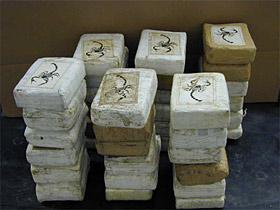 |
 |
 |
 News Around the Republic of Mexico | August 2005 News Around the Republic of Mexico | August 2005  
Mexico Runs Drug Trade to U.S.
 Danna Harman - Christian Science Monitor Danna Harman - Christian Science Monitor


| | The kingpins of this hemisphere's drug trade are no longer Colombians. |
In the largest reorganization since the 1980s, senior U.S. officials say, Mexican cartels have leveraged the profits from their delivery routes to wrest control from the Colombian producers. The shift is also because of the success authorities have had in cracking down on Colombia's kingpins.

As a result, Mexican drug lords are calling the shots in what the United Nations estimates is a $142 billion a year business in cocaine, heroin, marijuana, methamphetamine and other illicit drugs on U.S. streets.

"Today, the Mexicans have taken over and are running the organized crime, and getting the bulk of the money," John Walters, White House drug czar, said in an interview. "The Colombians have pulled back."

One consequence of the new dominance of Mexican cartels is a spike in violence, especially along the 2,000-mile U.S.-Mexican border where rival cartels are warring not only against Mexican and U.S. authorities, but also against one another for control of the lucrative transit corridors.

Although the Colombian cartels still control most of the production of cocaine and heroin, explained Jorge Chabat, a drug expert at the Center for Economic Research and Teaching in Mexico City, the more profitable part of the trade, transport to the United States and distribution there, has come under control of various Mexican cartels. Those organizations include Osiel Cardenas' Gulf cartel, Joaquin "El Chapo" Guzman's Sinaloa cartel, Arellano Felix's organization in Tijuana, and the Juarez cartel, said to be led by Vicente Carrillo.

"With the successful dismantling of some of the biggest cartels in Colombia, it was only natural that the Mexicans, who had for years had close contacts with the Colombians and knew the routes and the business, would take over," Chabat said.

The drugs, says Ron Brooks, president of the U.S. National Narcotics Officers Association in West Covina, Calif., are either flown from Colombia to Mexico in small planes, or, in the case of marijuana and methamphetamine, are produced locally. Then, the drugs are shipped into the US by boat, private vehicles, or in commercial trucks crossing the border.

According to the Bureau for International Narcotics and Law Enforcement Affairs, as much as 90 percent of the cocaine sold in the United States in 2004 was smuggled through Mexican territory. Mexico is also the No. 2 supplier of heroin, the largest foreign source of marijuana, and the largest producer of methamphetamine.

Arthur Werge, FBI special agent in El Paso, points to the low crime rate in El Paso as evidence the violence is stopping at the border.

"People cross over and abide by the law," he said. "We won't tolerate anything else. . . . You won't find people driving around with AK47s, executing police officers or throwing bodies wrapped up in blankets on the side of the road."

But others, including Walters, of the U.S. Office of National Drug Control Policy, say its only a matter of time before the border violence reaches into the United States. "The killing of rival traffickers is already spilling across the border," he said. "Witnesses are being killed. We do not think the border is a shield."

Since President Vicente Fox came to power in 2000, 36,000 drug traffickers have been arrested, among them top figures from almost all the cartels, according to the National Center for Analysis Planning and Intelligence against Organized Crime in Mexico City.

Furthermore, more than 2,000 police officers were investigated for corruption in connection with drug trafficking, and 711 officers were ultimately charged with offenses ranging from receiving bribes from cartels to kidnapping and murder. The former state police chief in Juarez is under investigation involving a murder.

But, observers say, these crackdown may have added to the violence.

Walters admitted there have been some unwanted consequences to the arrests. "President Fox has taken an aggressive role which leads to . . . power vacuums and destabilization, with one cartel attacking the other," he said. "In a way, the violence is terrible but also a sign that the cartels are being squeezed by government."

U.S. officials claim that the Mexican government's reluctance to extradite top drug criminals, the way Colombia has, is hampering efforts. Colombia has extradited 173 drug suspects since 2002, including many major figures, to the United States.

Mexico extradited a record 34 in 2004, but no major drug lords.

"I understand the difficulty in extraditing nationals, but left in Mexican jails these people continue to run the show," Walters said.

"And the show," Juarez Police Chief Navarette said, "is not a pretty one." | 
 | |
 |



